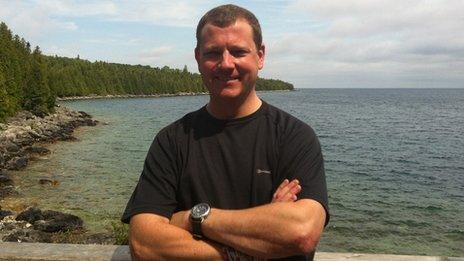Cold turkey on a 'digital detox'
- Published

Stuart puts on a brave face, despite being Facebook-less
So you're on holiday and you lose your internet connection. Is this such a bad thing, asks BBC producer Stuart Hughes, a technology addict who experienced an involuntary "digital detox" in the wilds of Ontario.
"I am out of the office and will respond on my return."
My automated email response has always been something of a white lie. Flitting from smartphone to office computer to iPad, I'm always logged in somewhere - around the clock and seven days a week.
I'm hardly in the minority.
The firewall between our work and home lives is melting fast.
A recent survey by Forbes Insights revealed that just 3% of respondents didn't send or receive emails while on holiday. A study, external by researchers in the United States claims that checking emails and social media may be harder to resist than cigarettes or alcohol.
I had long promised to cleanse my system by locking my electronic devices away for a few days. Like most addicts, though, I always found another excuse not to give up.
When it finally came about, my digital detox was not entirely voluntary.
I recently flew to Canada for a family road trip. For 48 hours after leaving the wired communities around Toronto, I maintained the illusion of being offline. In reality, thanks to a 3G signal, I was as plugged in as I would have been in London, New York or Tokyo.
But as I headed deeper into northern Ontario, centres of population became more scattered - and so did a reliable connection. Two hours outside the mining city of Sudbury, I pulled out my phone, ready to post a Facebook update.
It was then that I was confronted by two words guaranteed to bring any web junkie out in a cold sweat.
"No service."
That night I lay in my camper van, listening to the grasshoppers in the forest outside, hoping I'd wake up to find the network had been restored.

There are worse places to experience technology withdrawal
Dawn broke, warm, bright and clear, over Halfway Lake. Canada geese flew in formation over the water.
I checked my phone again.
No new emails. No Facebook updates. No tweets. Not even a lowly text message. The withdrawal symptoms of digital cold turkey began to gnaw.
What if war had broken out overnight? What if I had missed the latest Twitterstorm?
My inbox may have been overflowing, my Twitter feed crackling like a campfire. I simply had no way of knowing.
I cursed myself for not having packed the laptop-sized satellite dish I use on BBC assignments to access the web from far flung corners of the globe.
In desperation, I fell back on more traditional news sources and tuned my portable radio to the Canadian broadcaster CBC.
There was lively discussion of Quebec's forthcoming provincial election and Canada's Olympic (mis)fortunes in London - but no mention of events at Westminster or Team GB's triumphs.
With three long disconnected days and nights stretching ahead of me, I realised I had two choices. I could either fret over what I might be missing - or embrace the unknown.
I opted for the latter. Slowly, as the virtual world receded, the real world in front of me came into sharper focus.
I canoed across vodka-clear lakes, paddling hard against a side wind to steer my boat away from the rocky shoreline. I cheered on my five-year-old son as he took his first tentative steps on horseback. By torchlight I devoured books - ones with real pages made of paper rather than downloaded onto a Kindle.
After three nights in the wilderness, I returned to civilisation.
Never usually a fan of the Golden Arches, the free wi-fi offered at a truck-stop branch of MacDonald's made me feel like a man arriving at an oasis after walking across the desert.
I downloaded my emails. I checked Facebook and Twitter. I scanned the newspapers I had missed.
And I felt a wave of disappointment. More than 500 emails were waiting in my inbox - but most were irrelevant or out of date. Twitter was as catty, witty, but ultimately transitory as ever.
According to Facebook, most of my friends had taken up semi-permanent residence in the Olympic Park. It was entertaining - but hardly need-to-know information.

How much would you miss these gizmos?
I, meanwhile, had stored up timeless memories, perhaps made all the more precious by the fact they were personal and private, not tweeted, texted or emailed with my social network.
While I wouldn't say the experience cured me of my internet addiction, an enforced digital detox was certainly instructive. It made me realise how reliant I've become on instant online gratification - news when I want it, films and music on demand, banter across time zones at the speed of Twitter.
I now plan to make my personal reboot an annual event - a once-yearly opportunity to defrag my brain and reassess what's really important.
The wired world can manage perfectly well without me.